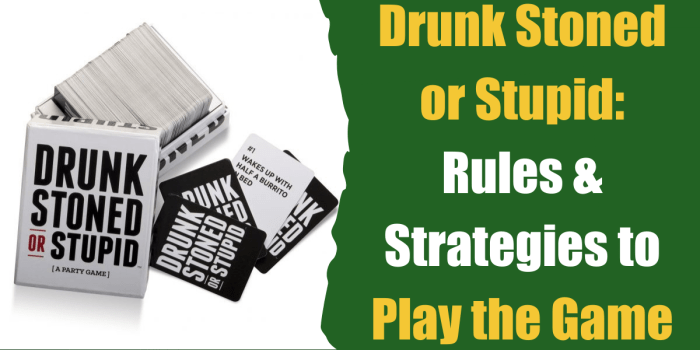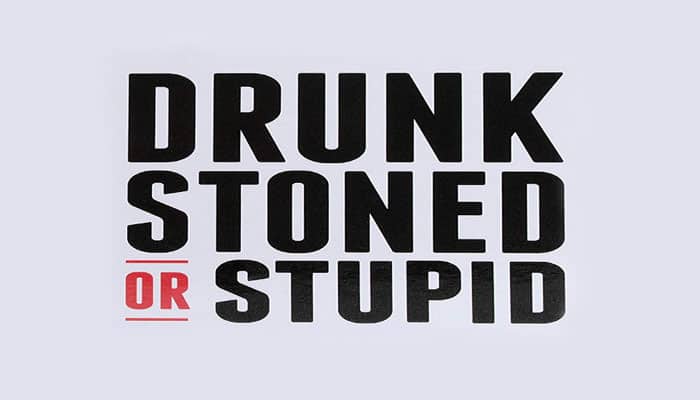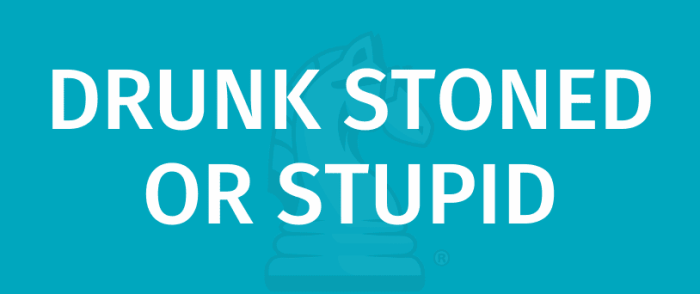Drunk stupid or stoned rules – Drunk, stupid, or stoned rules are a serious matter with far-reaching consequences. Alcohol and drugs can impair judgment, coordination, and decision-making, making it extremely dangerous to operate a vehicle. This article explores the physiological and psychological effects of these substances, the legal consequences of driving while impaired, and the societal impact of drunk or stoned driving.
We will also discuss effective prevention and intervention strategies, technological advancements in detection and prevention, and the ethical and legal considerations surrounding this issue.
The content of the second paragraph that provides descriptive and clear information about the topic
Effects of Alcohol and Drugs on Behavior

Alcohol and drugs can significantly impact our behavior by altering the brain’s normal functioning. They affect various neurotransmitters and brain regions, leading to changes in mood, cognition, and physical coordination.
Alcohol, for instance, acts as a depressant, slowing down brain activity and impairing judgment and coordination. It can lead to slurred speech, impaired reaction times, and reduced inhibitions. Chronic alcohol consumption can cause liver damage, heart disease, and other health issues.
Physiological Effects
- Impaired coordination and motor skills
- Slowed reaction times
- Slurred speech
- Reduced inhibitions
- Nausea and vomiting
- Cardiovascular problems
- Liver damage
Psychological Effects
- Mood swings
- Impaired judgment
- Reduced cognitive abilities
- Anxiety and depression
- Increased risk of mental health disorders
- Memory loss
- Addiction
Addiction
Repeated substance use can lead to addiction, a chronic condition characterized by compulsive drug-seeking behavior despite negative consequences. Addiction involves changes in brain chemistry and structure, making it difficult to quit substance use without professional help.
Long-Term Health Consequences
Long-term substance abuse can have severe health consequences, including:
- Liver cirrhosis
- Heart disease
- Cancer
- Stroke
- Mental health disorders
- Premature death
Legal Consequences of Driving While Impaired
Driving under the influence of alcohol or drugs is a serious offense that can have severe legal consequences. The laws and penalties for driving under the influence (DUI) or driving while intoxicated (DWI) vary from state to state, but they all share the common goal of deterring people from driving while impaired.
Per Se Laws
Many states have adopted “per se” laws that establish a legal limit for intoxication. This means that a driver is considered to be intoxicated if their blood alcohol concentration (BAC) is above a certain level, regardless of whether they are showing any signs of impairment.
The legal BAC limit is typically 0.08%, but it can be lower in some states.
Consequences of a DUI/DWI Conviction
The consequences of a DUI/DWI conviction can be significant. In addition to fines and jail time, drivers may also face license suspension or revocation. They may also be required to install an ignition interlock device in their vehicle. This device prevents the vehicle from starting if the driver has been drinking.DUI/DWI
convictions can also have long-term consequences. They can make it difficult to get a job, obtain insurance, or rent an apartment. They can also damage a person’s reputation and relationships.
Societal Impact of Drunk or Stoned Driving: Drunk Stupid Or Stoned Rules

Drunk or stoned driving is a major societal problem with far-reaching consequences. It is a leading cause of preventable deaths and injuries, and it can have a devastating impact on the lives of victims and their families.
According to the National Highway Traffic Safety Administration (NHTSA), in 2020, there were 13,142 traffic fatalities in crashes involving a drunk driver. This accounted for 31% of all traffic fatalities for the year. Additionally, an estimated 230,000 people were injured in crashes involving a drunk driver in 2020.
The emotional toll of drunk or stoned driving is immeasurable. Victims and their families often experience grief, anger, and guilt. They may also struggle with financial difficulties due to medical expenses and lost wages.
Drunk or stoned driving also has a significant financial impact on society. In 2020, the economic cost of drunk driving crashes was estimated to be $45 billion. This includes the cost of medical care, property damage, lost productivity, and pain and suffering.
Public awareness campaigns and educational programs play a vital role in reducing drunk or stoned driving. These campaigns can help to change social norms and attitudes about drunk driving, and they can provide information about the dangers of driving while impaired.
In addition to public awareness campaigns, there are a number of other measures that can be taken to reduce drunk or stoned driving, such as:
- Increasing the penalties for drunk or stoned driving.
- Setting up sobriety checkpoints.
- Providing safe rides home for people who have been drinking or using drugs.
- Encouraging the use of designated drivers.
By working together, we can help to reduce the devastating impact of drunk or stoned driving on our society.
Prevention and Intervention Strategies

Drunk or stoned driving is a serious issue that poses significant risks to individuals, families, and society as a whole. To combat this problem effectively, it is crucial to implement comprehensive prevention and intervention strategies.
Designated Driver Programs and Ride-Sharing Services
Designated driver programs encourage individuals to select a sober person to drive after a social gathering or event where alcohol or drugs may have been consumed. This approach ensures that everyone has a safe ride home, reducing the likelihood of drunk or stoned driving.
Ride-sharing services like Uber and Lyft offer an alternative mode of transportation for those who have consumed alcohol or drugs. By providing a convenient and affordable option, these services make it easier for individuals to make responsible choices and avoid driving under the influence.
Role of Law Enforcement, Drunk stupid or stoned rules
Law enforcement plays a vital role in deterring and apprehending impaired drivers. Through routine traffic stops, sobriety checkpoints, and DUI patrols, law enforcement officers can identify and remove intoxicated individuals from the roadways.
Drunk, stupid, or stoned rules can vary depending on the situation, but one thing that’s always important to remember is to stay hydrated. That’s where the molar mass of k2c2o4 h2o comes in. Knowing how to calculate this value can help you determine how much water you need to drink to stay healthy.
So, whether you’re trying to avoid a hangover or just want to make sure you’re getting enough fluids, it’s worth learning about the molar mass of k2c2o4 h2o. And remember, when in doubt, always drink plenty of water.
Strict penalties, including fines, jail time, and license suspensions, serve as deterrents against drunk or stoned driving. Law enforcement’s presence on the roads sends a clear message that impaired driving will not be tolerated.
Early Intervention and Treatment Programs
For individuals struggling with substance abuse, early intervention and treatment programs are essential. These programs provide support, counseling, and medical assistance to help individuals overcome their addiction and reduce the risk of future drunk or stoned driving incidents.
By addressing the underlying causes of substance abuse, these programs aim to prevent relapse and promote long-term recovery. This approach not only benefits the individual but also contributes to the safety of our communities.
Technological Advancements in Detection and Prevention

Technological advancements have played a significant role in enhancing the detection and prevention of drunk or stoned driving. These technologies have assisted law enforcement in identifying impaired drivers more accurately and efficiently, leading to a reduction in the number of impaired drivers on the road.
Breathalyzers
Breathalyzers are devices that measure the concentration of alcohol in a person’s breath. They are commonly used by law enforcement officers to determine if a driver is under the influence of alcohol. Breathalyzers provide a quick and non-invasive method of detecting alcohol impairment.
Roadside Sobriety Tests
Roadside sobriety tests are a series of physical and mental exercises used by law enforcement officers to assess a driver’s level of impairment. These tests include tasks such as walking in a straight line, reciting the alphabet, and performing eye movements.
Roadside sobriety tests provide a standardized method of evaluating a driver’s coordination, balance, and cognitive abilities.
Potential Privacy Concerns
While these technologies have proven effective in detecting impaired drivers, they have also raised privacy concerns. Breathalyzers and roadside sobriety tests can collect personal information, such as a person’s breath sample or performance on physical tests. This information could potentially be used for other purposes beyond traffic enforcement, such as in criminal investigations.
Ethical and Legal Considerations

Ethical Implications
Punishing individuals for driving while intoxicated raises ethical concerns about balancing personal freedom and public safety. Some argue that individuals should be held responsible for their actions while intoxicated, as it poses a danger to themselves and others. Others believe that addiction is a disease that should be treated rather than punished, and that incarceration can worsen the problem.
Legal Defenses
In DUI/DWI cases, defendants may present various legal defenses, including medical conditions such as sleep disorders or seizures that can impair driving abilities. Involuntary intoxication, where an individual is unknowingly given drugs or alcohol without their consent, may also be a valid defense.
Balancing Rights and Safety
Determining the appropriate balance between individual rights and public safety is a complex issue. Some argue that strict penalties are necessary to deter drunk driving and protect the public. Others believe that focusing on rehabilitation and education is more effective in preventing repeat offenses while respecting individual rights.
FAQ Overview
What are the legal consequences of driving while intoxicated?
The legal consequences of driving while intoxicated vary depending on the jurisdiction, but generally include fines, jail time, and license suspension.
What are the potential health consequences of drunk or stoned driving?
Drunk or stoned driving can lead to a variety of health consequences, including injuries, death, and long-term health problems.
What are some effective prevention strategies for drunk or stoned driving?
Effective prevention strategies for drunk or stoned driving include designated driver programs, ride-sharing services, and public awareness campaigns.